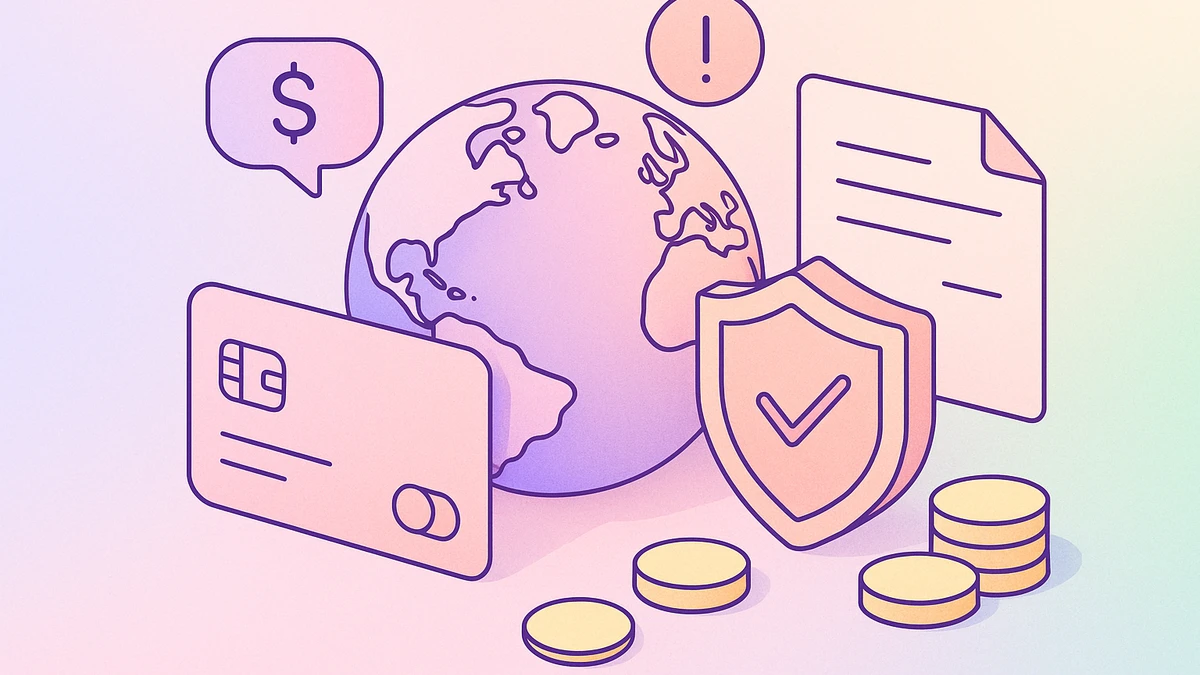Quelles solutions contre le risque de défaut de paiement à l’international ?
Résumez cet article avec l'IA
Ouvrez l'article dans votre IA préférée pour le résumer, l'explorer et l'enregistrer pour plus tard.

À l’international, un simple impayé peut déséquilibrer la trésorerie d’une entreprise. Le risque de défaut de paiement est plus élevé qu’en local, notamment en l’absence de garanties solides. Voici les causes principales, les bonnes pratiques à adopter et comment Heropay permet de sécuriser vos transactions.
Qu’est-ce qu’un défaut de paiement à l’international ?
Un défaut de paiement à l’international désigne le non-règlement d’une facture par un client étranger dans les délais convenus. Cela peut être un retard ou un impayé total, volontaire ou non.
Ce type de situation est plus fréquent à l’export qu’en local, car plusieurs facteurs augmentent le risque :
La distance géographique
Les délais de traitement bancaire
Les systèmes juridiques différents
La volatilité des devises
Selon Allianz Trade, 40 % des entreprises exportatrices subissent au moins un défaut de paiement par an. Les conséquences sont directes :
Tension de trésorerie sur les encaissements
Litiges commerciaux longs à résoudre
Risque de perte sèche, notamment si aucun acompte ni garantie n’ont été négociés
Pourquoi le risque de défaut est plus élevé à l’international ?
Faire du business à l’étranger expose à des risques supplémentaires qu’on ne retrouve pas dans les échanges locaux.
Ces risques rendent le recouvrement plus incertain et plus coûteux, surtout quand aucun filet de sécurité n’a été mis en place en amont.
La distance et la complexité des procédures de recouvrement
Plus un client est loin, plus il est compliqué de suivre le paiement, relancer ou initier des actions légales.
En cas de litige, les délais s’allongent et les frais explosent. Sans partenaire local ou avocat spécialisé, les chances de récupérer l’argent chutent drastiquement.
Les différences de réglementation et de système judiciaire
Chaque pays a ses propres règles : délais de prescription, exigences contractuelles, juridictions compétentes. Ce flou juridique joue souvent en défaveur du fournisseur étranger, qui doit composer avec des procédures qu’il ne maîtrise pas.
Les risques politiques et macroéconomiques locaux
Crises économiques, sanctions internationales, instabilité politique : autant de facteurs qui peuvent bloquer un paiement ou geler un transfert.
D’après Euler Hermes, les risques pays sont l’un des principaux déclencheurs de défaut de paiement export, surtout dans les marchés émergents.
L’instabilité des devises et les fluctuations du taux de change
Même si le client règle la facture, le montant réellement perçu peut être largement inférieur à ce qui était prévu, à cause de la volatilité du taux de change.
Par exemple, en 2023, l’euro a perdu jusqu’à 15 % face au dollar, ce qui a mécaniquement réduit la marge de milliers d’exportateurs.
Quelles solutions pour prévenir un défaut de paiement à l’international ?
Anticiper le risque, c’est souvent ce qui fait la différence entre une exportation rentable et une facture jamais encaissée. Plusieurs leviers permettent de sécuriser la transaction dès le départ.
Évaluer la solvabilité du client à l’étranger
Avant d’accepter une commande, il est essentiel de vérifier la santé financière du client. Pour cela, vous pouvez :
Demander des bilans ou attestations bancaires
Interroger des bases de données spécialisées
S’appuyer sur des partenaires ou chambres de commerce locales
Encadrer les conditions de paiement dès la commande
Dès le devis ou la facture proforma, il faut poser un cadre clair. Cela passe par :
Des délais fermes
Des pénalités de retard explicites
Une devise de paiement fixée sans équivoque
Utiliser des garanties de paiement (lettre de crédit, acompte, etc.)
Certains mécanismes permettent de limiter les risques dès l’émission de la commande :
La lettre de crédit : le paiement est libéré uniquement si les conditions sont respectées
L’acompte : une partie est réglée avant livraison
Le paiement anticipé : possible pour les nouveaux clients à risque
Passer par une plateforme sécurisée comme Heropay
Heropay offre un cadre simple et sécurisé pour les paiements internationaux :
Taux de change sans surcoût
IBANs multi-devises pour recevoir les fonds plus facilement
Intégration avec les outils de facturation pour un suivi en temps réel
Quels outils pour se protéger contre les impayés ?
Même avec les meilleures précautions, un défaut peut arriver. Il est donc judicieux de s’équiper d’outils qui couvrent ce risque.
L’assurance-crédit export
Elle couvre le non-paiement d’un client étranger pour cause économique (faillite) ou politique (blocage des transferts, guerre, etc.). Certaines polices indemnisent jusqu’à 90 % des pertes.
Le crédit documentaire et la lettre de change
Ces instruments renforcent la sécurité des paiements :
Le crédit documentaire engage la banque du client à payer dès que les documents requis sont fournis
La lettre de change est un engagement de paiement signé, reconnu juridiquement dans la plupart des pays
Les solutions de paiement avec taux garanti
Certaines plateformes permettent de fixer un taux de change au moment de l’émission de la facture, évitant ainsi toute perte liée à une variation de devise avant encaissement.
La diversification des moyens de paiement et des IBANs
Ne pas dépendre d’un seul canal est un levier simple pour fluidifier l’encaissement.
Avoir plusieurs IBANs en devises locales permet au client de payer dans sa propre monnaie, réduisant ainsi le risque de blocage ou d’erreur.
Comment Heropay réduit le risque de défaut de paiement ?
Heropay propose une solution complète pour les pros qui veulent encaisser en toute confiance, même à l’international :
Des IBANs multi-devises pour recevoir les paiements localement
Des taux de change transparents, alignés sur ceux de Visa
Un suivi en temps réel de vos transactions
La possibilité de centraliser vos flux pour garder le contrôle sur votre trésorerie
Avec Heropay, vous réduisez à la fois les frais et le risque d’impayé, tout en offrant à vos clients des moyens de paiement simples et efficaces.